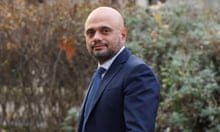Kishor did a degree in English literature and economics in Nepal and spent years as an English teacher in Kathmandu before moving to Afghanistan for three years to work with Nato troops. His English was fluent long before he came to the UK to study business.
But in 2014, a month before he was due to graduate in London, he received a letter from the Home Office accusing him of using a “proxy test taker” to sit an English test he had been required to take to extend his student visa. He was classified as an immigration offender and told he was liable for detention and removal.
Kishor was determined to challenge the accusation of cheating so he could complete his MBA and continue his life without a fraud allegation from the UK government on his record. However, he has struggled to make officials believe he did not cheat. Five years later, he remains in the UK, prevented by the government from working or studying; he is facing destitution and surviving with the help of food bank handouts.
Born in Nepal, where his father is a priest, Kishor was determined to learn English as a child. “When I was at school, English was my favourite subject. I used to listen to the BBC and Voice of America all the time,” he said. “It was my passion to have a good command of the English language. Knowing English is a matter of status and obviously it opens many doors.”
When he was interviewed to work with Canadian troops in Afghanistan, his English was tested. “It was a fundamental component of what they were looking for.” Afterwards he worked briefly in Dubai before deciding to come to the UK to study business. “I thought if I had British qualifications I could realise my ambitions to get a better job, upgrade myself.”
He had saved enough money to enrol at the London School of Marketing, but had to change when he realised a rep in Dubai had signed him up to a dubious institution; a second college he enrolled at was subsequently closed by the government during its crackdown on bogus institutions. Finally, he enrolled on an MBA programme at Anglia Ruskin University, and had to take an English language test as a formality as part of his visa renewal process. “It was pretty easy,” he said.
But the letter he received in 2014 accused him of deception, told him he was no longer allowed to study and informed him he needed to leave the country within 60 days. “My world turned upside down; it numbed me for some time.”
Kishor has tried to challenge the allegation several times in the courts, without success. He estimates he has spent more than £50,000 on legal fees and wasted tuition fees.
His parents and friends supported him for a while, when his savings ran out. “I’ve seen better days. It has had a massive impact on my life. I can’t move ahead.” He lives with his wife and two children, but is unable to work to provide for them. “Sometimes we go hungry. We don’t know how we will manage to pay the rent, buy food or pay the solicitors.”
Kishor, who has asked for his full name not to be printed, because he is concerned about his ongoing legal battle, has to report to the police every month to show he is complying with Home Office rules, and he knows he could be detained and removed at any point. He has been told he should return to Nepal to fight his case there. “I’ve consulted Nepali lawyers. There is no system in place to do that.”
A film released on Tuesday by the charity Migrant Voice, which has been campaigning on behalf of the students, shows other students with excellent English discussing how allegations of cheating have caused them serious complications.
Kishor believes the Home Office’s willingness to believe that tens of thousands of students cheated in the test of English for international communication (Toeic) was linked to its drive to vastly cut migration, and blames Theresa May, who was then the home secretary. “There was a political objective behind it. They wanted to trumpet that immigration was the biggest problem in the country and they needed to cut it down. They couldn’t do anything about EU citizens, so they found us an easy target. I have no doubt that the prime minister is responsible for this.
“Me and so many other international students came here with high hopes and great respect for this country and its educational institutions. I haven’t been given any record of how I cheated. We should be given a chance to prove our innocence.”






